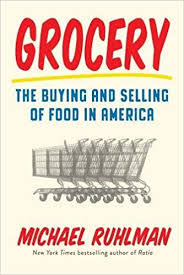Michael Ruhlman is a prolific author, writing mostly about food. He does cookbooks, recipes, reviews, books, blogs, articles and more. He is always publishing, always getting prose out, and there is a good chance that you may have come across his work in a newspaper or magazine. It’s easy to understand why. Ruhlman writes as a friend, an informed colleague, and as the man next door (who loves to eat well).

Ruhlman’s recently published book, Grocery: The Buying and Selling of American Food, is a non-fiction account of the supermarket, written with a focus on a small family run chain, Heinen’s, in Cleveland. It is not a comprehensive account of the supermarket industry. Nor is it a business history, or what is all to common in the books about food, a polemic on what we should or should not be eating. Instead, Ruhlman is after information – about the store, they buying and selling of food, about his father, and about himself. To the extent that one can write a personal book about a grocery store, Ruhlman has done it. The book features some very interesting genre-crossing observations.
Ruhlman’s late father figures prominently. He loved to shop, to cook, and to feed people. Prominently among Ruhlman’s childhood memories are shopping with his father at Heinen’s, buying food for a week’s worth of meals, and large get togethers with family, friends and neighbors. The shopping trip represented family, prosperity, choice and optimism. Ruhlman senior was not alone in his love of the supermarket. We learn that for many, particularly of a certain generation, the boomers, fondness for grocery store trips and opulence is all too common.
Over the years, Ruhlman’s parents divorced, ending the shopping trips and the large meals. Ruhlman, too, is writing while experiencing a divorce and traumatic change. He grew up in Cleveland, but the book jacket notes that he now divides his time between New York City and Providence, Rhode Island. One does not have to be much of a detective to appreciate that this is a tangled book. Ruhlman’s interest in Heinen’s grocery is deeply tied to a host of memories, values and meaning. The knot of issues enhance, constrain and complicate the book.
The book is wide-ranging, moving from popular culture to what grocery store owners think and do, then back again. Ruhlman walks us around the supermarket, examining the differences in produce, dairy, delis and processed foods. There is a reason that milk is usually located at the back of a supermarket – and it’s more to do with a place for coolers than a marketing trick. The changes in how groceries operate and what they sell has been tremendous. More changes are anticipated, too. It’s a very complicated business with many moving parts and small profit margins.
The book concludes with the location of a Heinen’s in a restored downtown Cleveland building. It’s an expensive project. It also represents a new direction for the city and people’s expectation for shopping and food. Ruhlman is both elated by the new space and also saddened by loss.
Remember The Clash’s Lost in the Supermarket? Great track on one of the best albums of all time, London Calling, written all the way back in 1979. The song ran repeatedly through my head when reading Michael Ruhlman’s Grocery. Sometimes shopping is not really about shopping.
I’m all lost in the supermarket
I can never shop happily
I came in here for that special offer
A guaranteed personality
David Potash
